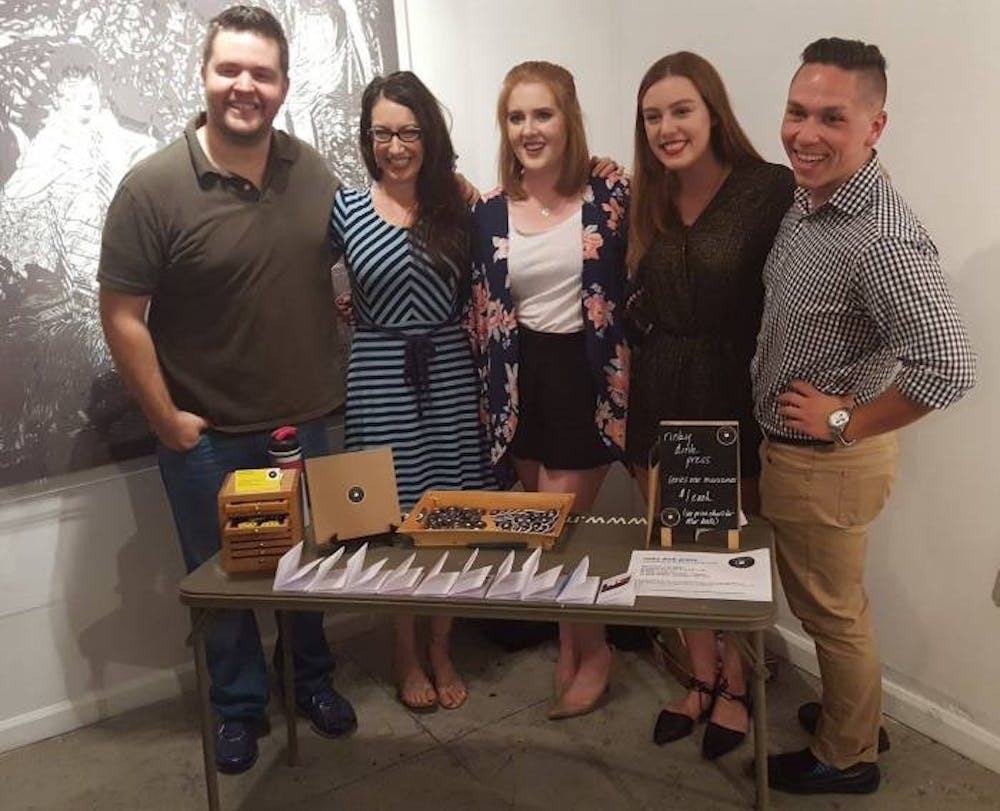"Come and go as you please. I will know you are with me though I can't see you, only hear you softly tearing up the tissue of my reason, or the very cloth of reality wrapped around it."
This poem, "Fabric" by Salvatore Difranco, will be featured alongside five of his other poems as part of a series of ten booklets published by the rinky dink press. The press, founded by professor Rosemarie Dombrowski and her students, will launch their second series of zines next Thursday, Dec. 8 at Grand Central Coffee.
Zines are typically small do-it-yourself works that can be published independently by a group or by presses that feature the work of other artists.
The rinky dink press in particular features micropoems, which are 25 to 40 words long.
The brevity is not a drawback to this style of poetry, Dombrowski said. In fact, she prefers it.
"It doesn't mean I don't still value some of the longer poems by the Romantic poets," she said. "Things that are powerful — that get people's attention — are tweets and Facebook posts and really good headlines on popular websites. So poetry needs to tap into that to some degree."
Dombrowski, the editor-in-chief of rinky dink, said that most small presses publish longer works or release bound journals, while rinky dink publishes small pocket-sized poetry booklets. Each booklet requires only one sheet of paper, put together with an origami-style fold.
For the second launch next Thursday, the press will be selling copies of 10 different sets of micropoems written by poets nationwide. There were more than 250 submissions from around the globe for its second publication, Dombrowski said.
"Once we put the call up, we almost immediately get 50 within the week," Dombrowski said. "This is such a niche type of writing. It's micropoetry. We're calling for a cohesive sequence of micropoems, so not every poet out there is going to be interested. You'd think that our submissions would be a lot less than they are, but we're pretty pleased."
The idea for the publication arose from Dombrowski's intermediate poetry class as well as her Radical Rebellions class, where students looked at revolutionary periods of poetry such as the Beat movement of the 1950s.
"I had just proposed the microzine as their final project," she said. "I said, 'How do you guys feel about this? What if we distributed something like this at First Friday, or at a reading, or at a store where people were looking for things other than poetry?' So they created political microzines as their final project."
Dombrowski said her intermediate poetry class also worked on microzines and eventually took all the zines to Wasted Ink Zine Distro. These poems would eventually become "series zero" for rinky dink.
"Collectively, (they were) the zines that inspired me and some of my students to start the real press," she said.
Katherine Hofland, a senior majoring in public service and public policy, has been an editor for rinky dink since the launch of its first series back in April.
"People are usually aiming towards publishing chapbooks and collections," Hofland said. "I think rinky dink press is really aiming to be more palatable to people these days. We're looking to be more acceptable to people who aren't buying books of poetry — people who aren't buying chapbooks anymore."
She said she has seen how the level of interest toward rinky dink has changed in the past few months and how the quality of the submissions has increased in comparison to "series one."
"This time they all really flow together within their own microseries," Hofland said. "So I think it's more exciting to see that people are interested in what we're putting out there."
Emily Holloway, an ASU graduate who received her BA in English in May, is new to the editorial staff and joined rinky dink for the second official launch of the publication.
"I had (Dombrowski) as a professor for several courses on the Downtown (Phoenix) campus, and we became good friends," Holloway said. "So she messaged me about the opportunity post-graduation. I had been involved with a beginning poetry workshop with her and unfortunately was unable to find the room in my schedule for the intermediate class, which was where rinky dink started. I think she knew I would be more than happy to come on in the future."
Rinky dink, Holloway says, holds a special place in the poetry scene in Phoenix.
"Rinky dink definitely has a place in the growing environment because it's unique," Holloway said. "People are drawn to the things that are different, and micropoetry definitely has a different effect than full-length pieces."
The zines are sold for $1 each, and other rinky dink merchandise will be sold during the launch. It will take place at Grand Central Coffee in downtown Phoenix from 7 to 9 p.m. on Thursday, Dec. 8.
Reach the reporter at mphan2@asu.edu or follow @mvyphvn on Twitter.
Like The State Press on Facebook and follow @statepress on Twitter.




